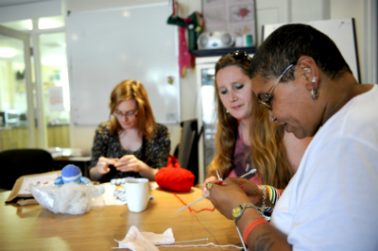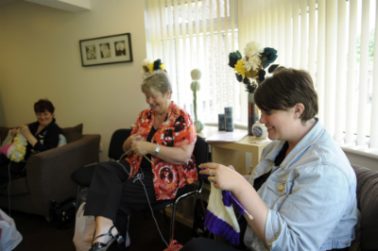How do Women’s Community Service Providers contribute to reducing offending behaviour of women?
What are Women’s Community Service Providers?
Women’s Community Service Providers are gender specific interventions that are available through community based, third sector organisations.
Guiding principles for developing a gender responsive approach to criminal justice policy:
- Gender: Acknowledge that gender makes a difference.
- Environment: Create an environment based on safety, respect, and dignity.
- Relationships: Develop policies, practices and programs that are relational and promote healthy connections to children, family, significant others, and the community.
- Services and Supervision: Address the issues of substance abuse, trauma, and mental health through comprehensive, integrated, culturally relevant services and appropriate supervision.
- Economic and Social Status: Improve women’s economic/social conditions by developing their capacity to be self-sufficient.
- Community: Establish a system of community supervision and re-entry with comprehensive, collaborative services.
The services that they provide:
- Promote empowerment, choice and self-determination;
- Place importance on the underlying causes of their distress in addition to their symptoms;
- Address important issues relating to women including mothers, the need for safe accommodation and access to education, training and work opportunities;
- Value their strengths, abilities and potential for recovery of the women that they work with.
Characteristics of Women’s Community Service Providers
Although Women’s Community Service Providers will vary in their design and delivery as they are adapted to their local context, they share some core characteristics:
- A women only environment to ensure that women feel safe and secure.
- Individually tailored support that addresses each woman’s unique needs.
- A holistic approach which addresses every aspect of a woman’s life, to ensure that underlying causes of offending are addressed.
- A multi-agency partnership approach, working with many statutory and voluntary organisations to provide a broad range of services to women to help them address all of their needs.
- A ‘one stop shop’ model whereby women can access a range of services in one place or from one key worker having specialist knowledge and expertise in working with women.
A woman’s journey
When a woman attends a centre that has made a commitment to offer gender-specific community based solutions, she will be assigned a key worker who will support her to make changes to her life. They will do an assessment together, looking at the areas in her life which she might like to change, and they will then develop a support plan which will work around nine pathways to reducing re-offending. These are:
- Accommodation
- Skills and employment
- Health
- Drugs and Alcohol
- Finance, Benefit and Debt
- Children, families and relationships
- Attitudes, thinking and behaviour
- Supporting women who have been abused, raped or experienced domestic violence
- Supporting women who are or have been involved in prostitution
Referrals
As Women’s Community Service Providers are committed to multi-agency working women can come to them through a variety of different routes.



